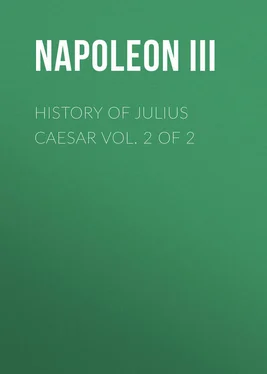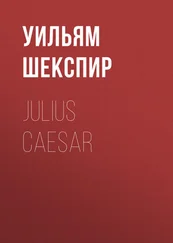Napoleon III - History of Julius Caesar Vol. 2 of 2
Здесь есть возможность читать онлайн «Napoleon III - History of Julius Caesar Vol. 2 of 2» — ознакомительный отрывок электронной книги совершенно бесплатно, а после прочтения отрывка купить полную версию. В некоторых случаях можно слушать аудио, скачать через торрент в формате fb2 и присутствует краткое содержание. Жанр: foreign_antique, foreign_prose, Биографии и Мемуары, на английском языке. Описание произведения, (предисловие) а так же отзывы посетителей доступны на портале библиотеки ЛибКат.
- Название:History of Julius Caesar Vol. 2 of 2
- Автор:
- Жанр:
- Год:неизвестен
- ISBN:нет данных
- Рейтинг книги:4 / 5. Голосов: 1
-
Избранное:Добавить в избранное
- Отзывы:
-
Ваша оценка:
- 80
- 1
- 2
- 3
- 4
- 5
History of Julius Caesar Vol. 2 of 2: краткое содержание, описание и аннотация
Предлагаем к чтению аннотацию, описание, краткое содержание или предисловие (зависит от того, что написал сам автор книги «History of Julius Caesar Vol. 2 of 2»). Если вы не нашли необходимую информацию о книге — напишите в комментариях, мы постараемся отыскать её.
History of Julius Caesar Vol. 2 of 2 — читать онлайн ознакомительный отрывок
Ниже представлен текст книги, разбитый по страницам. Система сохранения места последней прочитанной страницы, позволяет с удобством читать онлайн бесплатно книгу «History of Julius Caesar Vol. 2 of 2», без необходимости каждый раз заново искать на чём Вы остановились. Поставьте закладку, и сможете в любой момент перейти на страницу, на которой закончили чтение.
Интервал:
Закладка:
And thus no war excited the public feeling so intensely as that of Gaul. Though Pompey had carried the Roman eagles to the shores of the Caspian Sea, and, by the tributes he had imposed on the vanquished, doubled the revenues of the State, his triumphs had only obtained ten days of thanksgivings. The Senate decreed fifteen, 29 29 Plutarch, Cæsar , 41. – Appian, Civil Wars , II. 41.
and even twenty, 30 30 Appian, Civil Wars , II. 41.
for Cæsar’s victories, and, in honour of them, the people offered sacrifices during sixty days. 31 31 Cicero, Orat. de Provinciis Consularibus , 11. – Dio Cassius, XL. 50.
When, therefore, Suetonius ascribes the inspiration of the campaigns of this great man to the mere desire of enriching himself with plunder, he is false to history and to good sense, and assigns the most vulgar motive to a noble design. When other historians ascribe to Cæsar the sole intention of seeking in Gaul a means of rising to the supreme power by civil war, they show, as we have remarked elsewhere, a distorted view; they judge events by their final result, instead of calmly estimating the causes which have produced them.
The sequel of this history will prove that all the responsibility of the civil war belongs not to Cæsar, but to Pompey. And although the former had his eyes incessantly fixed on his enemies at Rome, none the less for that he pursued his conquests, without making them subordinate to his personal interests. If he had sought only his own elevation in his military successes, he would have followed an entirely opposite course. We should not have seen him sustain during eight years a desperate struggle, and incur the risks of enterprises such as those of Great Britain and Germany. After his first campaigns, he need only have returned to Rome to profit by the advantages he had acquired; for, as Cicero says, 32 32 Cicero, Orat. de Provinciis Consularibus , 14.
“he had already done enough for his glory, if he had not done enough for the Republic;” and the same orator adds: “Why would Cæsar himself remain in his province, if it were not to deliver to the Roman people complete a work which was already nearly finished? Is he retained by the agreeableness of the country, by the beauty of the towns, by the politeness and amenity of the individuals and peoples, by the lust of victory, by the desire of extending the limits of our empire? Is there anything more uncultivated than those countries, ruder than those towns, more ferocious than those peoples, and more admirable than the multiplicity of Cæsar’s victories? Can he find limits farther off than the ocean? Would his return to his country offend either the people who sent him or the Senate which has loaded him with honours? Would his absence increase the desire we have to see him? Would it not rather contribute, through lapse of time, to make people forget him, and to cause the laurels to fade which he had gathered in the midst of the greatest perils? If, then, there any who love not Cæsar, it is not their policy to obtain his recall from his province, because that would be to recall him to glory, to triumph, to the congratulations and supreme honours of the Senate, to the favour of the equestrian order, to the affection of the people.” 33 33 Cicero, Orat. de Provinciis Cousularibus , 12.
Thus, after the end of 698, he might have led his army back into Italy, claimed triumph, and obtained power, without having to seize upon it, as Sylla, Marius, Cinna, and even Crassus and Pompey, had done.
If Cæsar had accepted the government of Gaul with the sole aim of having an army devoted to his designs, it must be admitted that so experienced a general would have taken, to commence a civil war, the simplest of the measures suggested by prudence: instead of separating himself from his army, he would have kept it with him, or, at least, brought it near to Italy, and distributed it in such a manner that he could re-assemble it quickly; he would have preserved, from the immense booty taken in Gaul, sums sufficient to supply the expenses of the war. Cæsar, on the contrary, as we shall see in the sequel, sends first to Pompey, without hesitation, two legions which are required from him under the pretext of the expedition against the Parthians. He undertakes to disband his troops if Pompey will do the same, and he arrives at Ravenna at the head of a single legion, leaving the others beyond the Alps, distributed from the Sambre as far as the Saône. 34 34 It is stated in the “Commentaries” that Cæsar placed in winter quarters four legions among the Belgæ, and the same number among the Ædui. ( De Bello Gallico , VIII. 54.) – “Cæsar had with him but 5,000 men and 300 horse. He had left the rest of his army beyond the Alps.” (Plutarch, Cæsar , 36, and Appian, Civil Wars , II. 34.)
He keeps within the limit of his government without making any preparation which indicates hostile intentions, 35 35 Appian, Civil Wars , II. 35.
wishing, as Hirtius says, to settle the quarrel by justice rather than by arms. 36 36 De Bello Gallico , VIII. 55.
In fact, he has collected so little money in the military chest, that his soldiers club together to procure him the sums necessary for his enterprise, and that all voluntarily renounce their pay. 37 37 Suetonius, Cæsar , 68.
Cæsar offers Pompey an unconditional reconciliation, and it is only when he sees his advances rejected, and his adversaries meditating his ruin, that he boldly faces the forces of the Senate, and passes the Rubicon. It was not, then, the supreme power which Cæsar went into Gaul to seek, but the pure and elevated glory which arises from a national war, made in the traditional interest of the country.
Plan followed in the Relation of the War in Gaul.
IV. In reproducing in the following chapters the relation of the war in Gaul, we have borne in mind the words of Cicero. “Cæsar,” he says, “has written memoirs worthy of great praise. Deprived of all oratorical art, his style, like a handsome body stripped of clothing, presents itself naked, upright, and graceful. In his desire to furnish materials to future historians, he has, perhaps, done a thing agreeable to the little minds who will be tempted to load these natural graces with frivolous ornaments; but he has for ever deprived men of sense of the desire of writing, for nothing is more agreeable in history than a correct and luminous brevity.” 38 38 In Suetonius, Cæsar , 56. – Cicero, Brutus , 75.
Hirtius, on his part, expresses himself in the following terms: “These memoirs enjoy an approval so general, that Cæsar has much more taken from others than given to them the power of writing the history of the events which they recount. We have still more reasons than all others for admiring it, for others know only how correct and accurate this book is; we know the facility and rapidity with which it was composed.” 39 39 Preface of Hirtius to Book VIII. of the “Commentaries.”
If we would act upon the advice of these writers, we must digress as little as possible from the “Commentaries,” but without restricting ourselves to a literal translation. We have, then, adopted the narrative of Cæsar, though sometimes changing the order of the matter: we have abridged passages where there was a prodigality of details, and developed those which required elucidation. In order to indicate in a more precise manner the localities which witnessed so many battles, we have employed the modern names, especially in cases where ancient geography did not furnish corresponding names.
The investigation of the battle-fields and siege operations has led to the discovery of visible and certain traces of the Roman entrenchments. The reader, by comparing the plans of the excavations with the text, will be convinced of the rigorous accuracy of Cæsar in describing the countries he passed over, and the works he caused to be executed.
Читать дальшеИнтервал:
Закладка:
Похожие книги на «History of Julius Caesar Vol. 2 of 2»
Представляем Вашему вниманию похожие книги на «History of Julius Caesar Vol. 2 of 2» списком для выбора. Мы отобрали схожую по названию и смыслу литературу в надежде предоставить читателям больше вариантов отыскать новые, интересные, ещё непрочитанные произведения.
Обсуждение, отзывы о книге «History of Julius Caesar Vol. 2 of 2» и просто собственные мнения читателей. Оставьте ваши комментарии, напишите, что Вы думаете о произведении, его смысле или главных героях. Укажите что конкретно понравилось, а что нет, и почему Вы так считаете.












